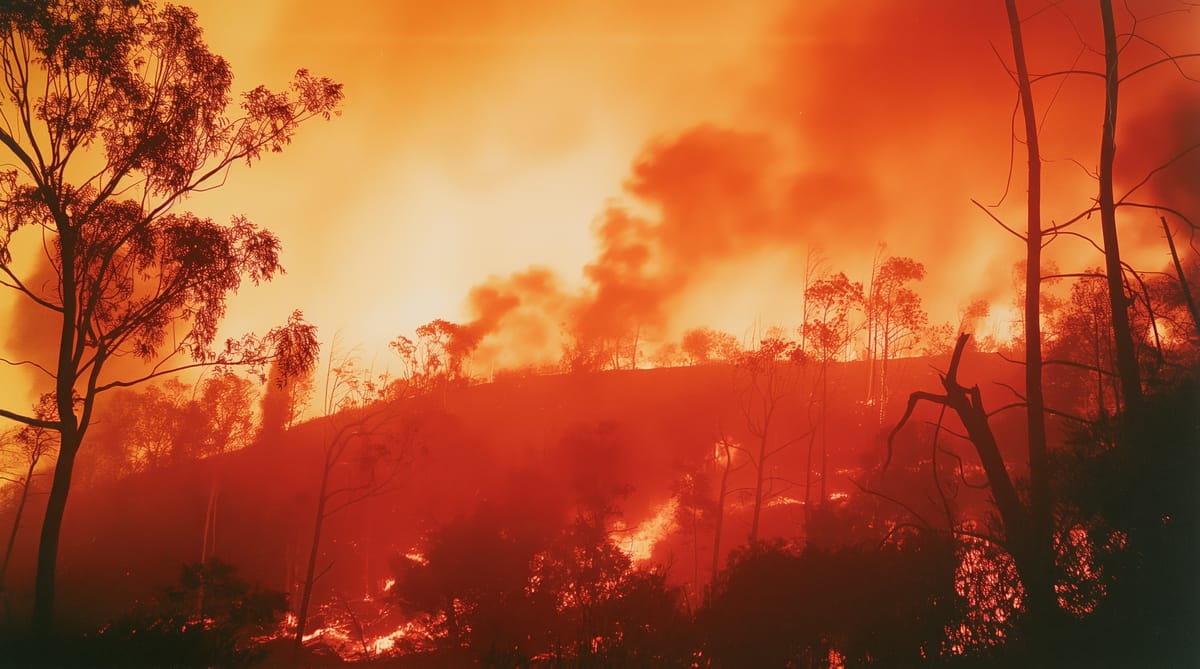Why we started Absurd Intelligence
Those of us who have been around the movement for many years can think back to a time we would tell ourselves, “When rich people in LA start losing their homes, things will change”...

Where do we go from here?
Has this question been bothering you lately? Perhaps it’s keeping you up at night, or following you around like an earworm you can’t get out of your head?
To be honest, I’d be amazed if it hasn’t been. It’s a question that’s on the tip of everyone’s tongue, but no one has an actual answer to. Not one that isn’t authoritarian. It seems to be haunting us, like a shadow that lurks in our news feeds, leaving us in a state of paralysis. I think of it as the spectre of our collective imagination, we no longer have the means to see beyond it.
It is a great question though. What the fuck are we meant to do now? Trump 2.0 is here. Elon Musk is soon to anoint himself king of the world. We are so far along the factory line of being packaged and sold by corporate capitalism, we hardly know ourselves, hopelessly disconnected from each other and the natural world. No one really believes politicians have a plan to get us out of the mess we’re in, nor that our systems of governance are fit for purpose.
And the climate and environmental crisis is happening so fast that we’re already acclimatised to it, scrolling faster when we see more videos of cities devastated by floods or fires. Those of us who have been around the movement for many years can think back to a time when we would tell ourselves, “When rich people in LA start losing their homes, things will change” and cringe now. Welp, how wrong we were.
We are living through a collective disorientation; humanity is sleepwalking into a perfect storm of climate, economic and democratic turmoil. Each of us is so in the grasp of hyperindividualism that it has altered the makeup of our very species; we no longer know how to work together to change things.
All the while, facts are miserably failing to drive action. Everywhere people ask “what now?” yet society is frozen like rabbits in the headlights of the intersecting crises of climate, war, inequality and rising fascism. We’ve so far proved incapable of articulating a big enough vision of what we could do differently, let alone of taking the steps to get there. Any ideas on the table seem stuck in old world thinking, believing if we just keep trying to get the right party elected eventually things will get better. But, the reality is, it wont. We urgently need to come unstuck and defibrillate the collective imagination to envision, embolden and then build something better for ourselves.
We started Absurd Intelligence, a small collective of activist communicators and storytellers who author this newsletter, to do that. Because we want to find an answer to that opening question: where do we go from here? In part to understand where we could be most useful after stepping away from the social movements we’d helped build. But also because, when we looked around at those trying to change things – whether politicians, NGOs or the movements we were a part of – we realised there was very little joined-up thinking around what that change should look like. So, it’s time to work that out.
Here’s how we believe we start doing that:
Tell a better story
This is being said a lot at the moment, which is a great thing, but there’s also a huge risk for attempts at this to go horribly wrong. Because repetitive narratives about Net Zero and the ‘difference between 1.5 and 2 degrees’ are simply not working to shake people from their complacency. They’re also being weaponised effectively against their very purpose.
We need a better story that speaks to people’s lived experiences, one that reclaims our sense of shared purpose from the far-right (and liberal) elites. One that channels the current widespread disorientation into action.
The past six years of activism, from Extinction Rebellion to Greta Thunberg to Palestine Action, have made clear the factual reality of our current predicament. The next phase of change however must be led not by reason, but the imagination.
We must collectively learn to see beyond the redundant frames that are failing to catalyse action, and we can no longer revert to policing and condemning those who don’t totally align with our way of thinking and how we speak. We need to use language that speaks to the majority of people, not simply by presenting the data, or by using platitudes thought up in university societies and NGO boardrooms. Meaningless epithets like ‘Keep 1.5 Alive’ and progressive calls like ‘Climate Justice’ have become empty signifiers, failing to grasp the reality of what our planetary situation actually demands of us. And Labour’s dead-eyed repetition of ‘growth’ seeks to keep us all firmly in an old, stuck story of production and consumption.
The new story depends on us valuing care, love and freedom above all else, not unlimited growth and balance sheets. It should allow us to celebrate the great things about our culture and our country that we can and should all be proud of, while understanding our heritage and facing the horrors of the past together.
Progressive thinking needs to move beyond moral hierarchies that shut so many out of the conversation, instead celebrating what we have in common and understanding our shared struggle. At the end of the day, everyone just wants to feel like they belong to something. That’s ultimately what far-right elites have been so good at giving people – while simultaneously hiding their real motivations: to avoid higher taxes and hoard both wealth and power. Many who feel shut out or left behind are flocking in disorientation to strongman leaders, whose rhetoric tells them their worst fears are true. We need to learn to trust one another again, to listen to people, and recognise our collective power when we come together.
Bring people back together
A culture of participation must emerge from this moment. With the Broligarchy taking over our means of communication, the most powerful thing we can do is meet each other again face to face in the places we live. Because it’s all well and good saying we need a new story, but that means nothing without the means to turn it into a reality. The new story starts – and will be told – in our neighbourhoods. Our power lies in being in physical proximity to one another, talking openly and honestly, with friends and neighbours – also in learning from those with whom we might not agree on everything.
It’s clear as day that a lack of political will stands in the way of progress on climate and rising inequality. Unless democracy catches up to today’s needs, then we might as well just pack it in and start constructing our bunkers (for all the good they will do us). That means building a grassroots movement that brings the disillusioned majority back into active political participation, and trains local people in deliberative processes so they can use them to empower their communities. Building a participatory culture can do this, using public assemblies to drive momentum and give a voice to those who have long felt shut out from our corrupt politics. If this takes hold, by the next UK election in 2029, a new political culture – assembly culture – led by local people, can take back power from Westminster and make the radical change we need become reality.
A mass movement in arts and culture
To shift people out of complacency and into active participation, culture urgently needs to come into service to a grassroots movement empowering people on the ground. We need art, songs, poems and stories that inspire people to dream big and then go out and fight for it.
As we attempt to encircle the Multifaceted Intersecting Shitshow that is the 21st Century, it is a better story, working in service to ground-up organising, that will ultimately transform the cultural context, and thereby our society’s willingness and ability to change. We must build a creative movement of storytellers, artists, designers and musicians to envision the safer, healthier world we need, and then create the clarion call to go and build it.
Embrace the absurd
I think most of us can look at the state of the world today and feel that we’re living in insane times. And if it was insanity that brought us to this moment, we’re going to need to think audaciously to get us out. Perhaps we can then break free of the yoke of believing that capitalism is the only idea left on the shelf.
As David Graeber famously said: “The ultimate hidden truth of the world is that it is something that we make, and could just as easily make differently.” So let’s make it differently. Let’s be unafraid to think beyond the old frames of understanding. Let’s be free in our creativity to imagine new ways to organise our societies. Unafraid to search beyond binary thinking and understand that what we’re facing is like nothing we’ve seen before. That’s both terrifying, but also an opportunity. To transform. To begin again.
What we’re up against is immense. The people set on destroying the world have all the money and the arsenal. But everyone else has the creativity and the courage. And above all, we have love.
So let’s stop asking where we go from here and be brave enough to start going. No one else will do that for us.
At the end of the day, it’s up to us.





